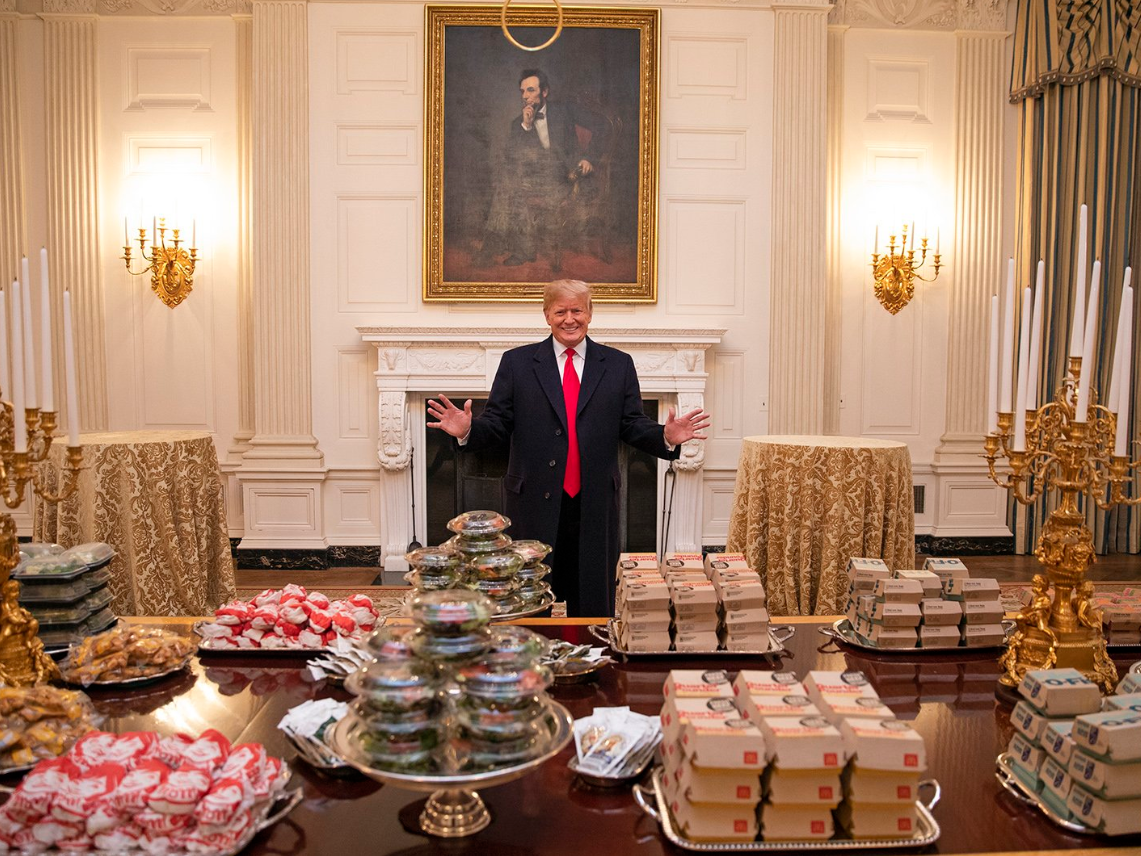The longest shutdown and a truly massive McDonald’s order
In the tenth instalment of our series recapping an unprecedented presidency, Joe Sommerlad looks at the president digging in his heels in a fight with Congress over border wall funding


Donald Trump had already overseen one government shutdown at the start of 2018 when agreement on a fresh spending bill was briefly stalled over a dispute with Congress on immigration.
It lasted only three days but nevertheless saw 692,000 federal employees furloughed, a mere appetiser compared with what would follow.
The president bookended the year with a matching battle over the approval of funds to complete his controversial southern border wall, which was fast becoming a white elephant to surpass even the Millennium Dome.
Trump had long since been forced to drop his tough guy election pledge that Mexico would be paying for the mighty monolith, which he envisioned as running 1,954 miles “from sea to shining sea”, across the borderlands and wildlife reserves of California, Arizona, New Mexico and Texas.
In fact, he had walked that brag all the way back to Washington by 11 December 2018, when he could be found hosting Democratic congressional leaders Nancy Pelosi and Chuck Schumer in the Oval Office and asking them to set aside $5.7bn in taxpayer funds to keep construction ticking over.
They refused, taking the tone of disapproving grandparents, prompting an angry, bee-stung Trump to declare: “I am proud to shut down the government for border security... I will take the mantle. I will be the one to shut it down.”
So began a feud that would see the US government running on empty from 22 December until 25 January 2019, its 35-day duration the longest in American history and leaving 380,000 federal employees furloughed and a further 420,000 agency workers expected to go without pay because of Trump’s petulance.
The 800,000 would finally get their salaries as back-pay after a bleak Christmas and not before long delays had occurred at airports, when unpaid air traffic controllers called in sick, IRS and FBI staff followed suit, the college football stars of the Clemson Tigers had to eat Big Macs at the White House due to an absence of caterers, the State of the Union was postponed and one little boy – nine-year-old Tiger Blaylock – became so fed up with the impasse that he told the BBC he had resorted to selling drawings online to support his mother.
“How much more American blood must be shed before Congress does its job?” Trump asked the nation hysterically in a televised address on 8 January, attempting to crank up the pressure on Pelosi and Schumer but ultimately failing to shift the blame.
When he finally relented after five weeks and signed a temporary bill – as the House speaker had suggested he do in the first place – granting him a paltry $1.4bn towards the job, conservative pundit Ann Coulter tweeted: “Good news for George Herbert Walker Bush: as of today, he is no longer the biggest wimp ever to serve as President of the United States.”
Trump wasn’t done there though, finally declaring that the problem of illegal immigration amounted to a national emergency on 15 February, a wheeze that enabled him to bypass Congress and reallocate funds from other government departments to bankroll the wall, eventually siphoning off $3.6bn from the Pentagon’s military construction coffers and $2.5bn from its drug interdiction programme.
One nine-year-old boy became so fed up with the impasse that he told the BBC he had resorted to selling drawings online to support his mother
The opposition protested against this “power grab”, but Trump simply vetoed their flimsy motion of disapproval the second it landed on the Resolute Desk and pressed on with his signature campaign promise.
In the middle of the shutdown, the Trump administration had suffered yet more HR upheaval when the president’s defence secretary Jim “Mad Dog” Mattis and chief of staff John Kelly both departed.
General Mattis had successfully talked Trump out of having Bashar al-Assad assassinated on 20 December but he decided to walk rather than endorse the president’s decision to withdraw US troops from Syria as part of his “America First” quest to end “forever wars”, which would have left a power vacuum and regional allies like the Kurdish SDF fighters exposed, with Isis – still not definitively vanquished, contrary to Trumpian claims – potentially free to exploit it.
Mattis was gone on New Year’s Day, his departure accelerated once the media got wind of it, and was swiftly followed by Kelly.
The man who had escorted the Mooch, Steve Bannon and aides Omarosa Manigault and Rob Porter to the back door in a doomed effort to instil discipline had been gradually ground down by the living nightmare of Trump’s West Wing, telling senators the previous June in private that it was “a miserable place to work” and steadily losing influence with the president thereafter.
The duo were replaced by Patrick Shanahan and Mick Mulvaney respectively in acting capacities, with one William Barr, a hobbyist bagpiper, also coming in as Trump’s new attorney general having served George HW Bush in the same position and after effectively applying for the job by sending the president an unsolicited 19-page memo picking holes in Robert Mueller’s Russia investigation.
Another Trump ally, the self-mythologising “political trickster” and bowler-hatted dandy, Roger Stone, was indicted by Mueller and arrested by the FBI on 25 January over his own murky intrigues during the campaign.
The Democrats, meanwhile, were newly emboldened following their success in the midterms - as the shutdown had just demonstrated.
While Pelosi quickly became a mortal enemy of Trump, he also found a useful opponent in the shape of Minnesota congresswoman and “Squad” member Ilhan Omar, born in Somalia and a US citizen since arriving as a teenage refugee in 1995.
When Omar dared to test her newfound prominence, somewhat naively, in February by criticising the American Israel Public Affairs Committee (AIPAC), accusing the lobbyist of enjoying outsized influence in DC, the president scented an opportunity.
Omar had tweeted that House minority leader Kevin McCarthy’s fawning over AIPAC was “all about the Benjamins” (a joke aligning Netanyahu with the $100 bill) before arguing that the group exerts “political influence in this country that says it is OK to push for allegiance to a foreign country”.
After the House was forced to respond by passing a resolution reiterating its condemnation of discrimination, Trump – perhaps with one eye on the antisemitism row then engulfing British opposition leader Jeremy Corbyn – leapt on the matter to absurdly accuse the Democrats of being an “anti-Jewish party”, going even further in August by saying Jewish Americans who voted for his opposition betray “either a total lack of knowledge or great disloyalty”.
Those statements were just the latest example of the president cultivating division with disingenuous rhetoric, nurturing a dangerous them-against-us mentality with total indifference to the consequences of his words.
Read the full The Trump Review series here


Join our commenting forum
Join thought-provoking conversations, follow other Independent readers and see their replies
Comments